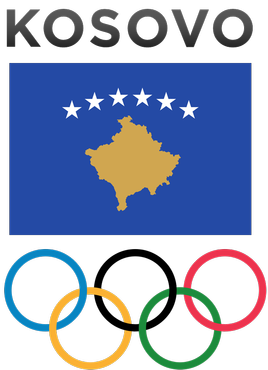
The Olympic Committee of Kosovo is the National Olympic Committee representing Kosovo. Officially established in 1992, the OCK became a full member of the International Olympic Committee and the Olympic Movement on 9 December 2014. It is responsible for Kosovo's participation at the Olympic Games.

Kosovo made its Olympic debut as a member state in 2016. Its team is organized by the Olympic Committee of Kosovo (OCK), created in 1992 and recognized by the International Olympic Committee on 9 December 2014. It won its first medal in its debut appearance in 2016, when judoka Majlinda Kelmendi took gold in the women's -52 kg category. In the 2020 Tokyo Olympics, Nora Gjakova won gold in the women's judo -57 kg class, and Distria Krasniqi won gold in the women's judo -48 kg class.
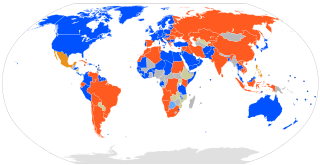
International recognition of Kosovo, since its declaration of independence from Serbia enacted on 17 February 2008, has been mixed, and international governments are divided on the issue.

On 17 February 2008, the majority of members of the Assembly of Kosovo, including Hashim Thaçi, and Fatmir Sejdiu, not acting in the capacity of PISG, declared Kosovo an independent and sovereign state. Kosovo was soon recognized as a sovereign state by the United States, Turkey, Albania, Austria, Germany, Italy, France, the United Kingdom, the Republic of China (Taiwan), and others. This triggered an international debate over whether Kosovo's unilateral declaration of independence had set a precedent in international law that could apply to other separatist movements, or whether it is a special case. The recognition of Kosovo's independence by 101 out of 193 UN states, according to many sources, has given fresh impetus to other separatist movements.

Russia–Serbia relations are the bilateral foreign relations between the Russian Federation and the Republic of Serbia. The countries established official diplomatic relations as Russian Empire and Principality of Serbia in 1816. Russia has an honorary consulate and embassy in Belgrade, and a liaison office to UNMIK, the capital of the disputed territory of Kosovo. Serbia has an embassy in Moscow, an honorary consulate in St. Petersburg, and has announced to open a consulate-general in Yekaterinburg.
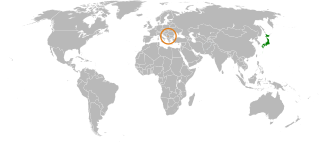
Japan–Kosovo relations are foreign relations between Japan and Kosovo. Kosovo declared its independence from Serbia on February 17, 2008, and Japan recognized it on March 18, 2008. According to the Japanese Ministry of Foreign Affairs, Japan and Kosovo established diplomatic relations on February 25, 2009.

Kosovo–Latvia relations are foreign relations between the Republic of Kosovo and the Republic of Latvia. Kosovo declared its independence from Serbia on 17 February 2008 and Latvia recognised it on 20 February 2008. Latvian and Kosovan governments established diplomatic relations on 11 June 2008. However, Latvia's involvement in Kosovo dates back to 2000 when it first sent peacekeeping troops.

Kosovo unilaterally declared independence from Serbia in 2008, a move which Serbia rejects. Serbia does not recognize Kosovo as an independent state and continues to claim it as the Autonomous Province of Kosovo and Metohija. Initially there were no relations between the two; however, in the following years there has been increased dialogue and cooperation between the two sides.

Serbia–Venezuela relations are foreign relations between Serbia and Venezuela. Serbia is represented in Venezuela through its embassy in Brasília (Brazil). Venezuela is represented in Serbia through its embassy in Belgrade.
Sport in Kosovo has established tradition and plays a prominent role in society. Popular sports in Kosovo include football, basketball, volleyball, handball, and rugby, whereas major individual sports include wrestling, judo, swimming, boxing, karate and skiing.
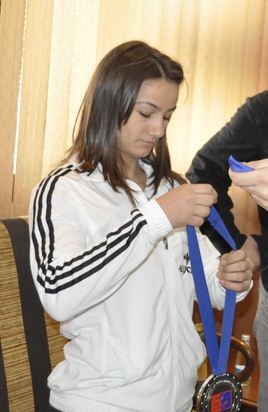
Majlinda Kelmendi is a Kosovan-Albanian former judoka and judo coach.

Albania competed at the 2012 Summer Olympics in London, United Kingdom from 27 July to 12 August 2012. This was the nation's seventh appearance at the Olympics since its debut in 1972. The National Olympic Committee of Albania sent a total of 11 athletes to the Games, seven men and four women, to compete in four sports. Weightlifter Hysen Pulaku was officially removed from the team on the first day, after failing a drug test for the banned anabolic steroid substance, as announced by the International Olympic Committee. Albania, however, has yet to win its first ever Olympic medal.

Kosovo's declaration of independence from Serbia was enacted on Sunday, 17 February 2008 by a unanimous vote of the Assembly of Kosovo. All 11 representatives of the Serb minority boycotted the proceedings. International reaction was mixed, and the world community continues to be divided on the issue of the international recognition of Kosovo. The Russian Federation’s reaction to the 2008 Kosovo Declaration of Independence is one of strong opposition.

The 2014 World Judo Championships were held in Chelyabinsk, Russia, from 25 to 31 August 2014, in the Traktor Ice Arena. Each participating country was permitted to present a total of 18 men and women judokas to participate in the 14 weight categories, but no more than two judokas from the same country were allowed to fight in the same category.

Kosovo participated at the 2016 Summer Olympics in Rio de Janeiro, Brazil from 5 to 21 August 2016. It was represented by the Olympic Committee of Kosovo (KOK/OKK) with a delegation of eight people, including three men and five women. Most of them were awarded places in their respective sporting events through wild card entries and Tripartite Commission invitations. Two Kosovar athletes, on the other hand, qualified directly for the Olympics on merit: judoka Nora Gjakova and Majlinda Kelmendi, the lone returning Olympian on the team after representing Albania four years earlier in London. The world's top-ranked judoka in her weight category and the frontrunner for the country's first Olympic medal, Kelmendi was selected to become Kosovo's flag bearer in the opening ceremony.

Kosovo (KOS) competed at the 2020 Summer Olympics in Tokyo, Japan, represented by the Olympic Committee of Kosovo (KOK/OKK). The nation had previously participated in the Summer Olympic Games on one occasion in 2016. A total of 11 athletes, five men and six women, were selected by the national committee to compete in six sports. Initially scheduled to take place during the summer of 2020, the games were postponed to 23 July to 8 August 2021 in relation to the pandemic of the coronavirus disease 2019 (COVID-19).
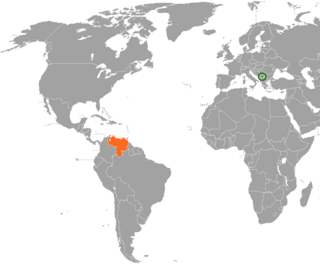
Kosovo–Venezuela relations are foreign relations between Kosovo and Venezuela. Formal diplomatic relations between two states are non-existent as Venezuela does not recognize Kosovo as a sovereign state.

Iraqi–Kosovar relations are foreign relations between Iraq and Kosovo. Formal diplomatic relations between two states are non-existent as Iraq does not recognize Kosovo as a sovereign state.

Kosovar–Sri Lankan relations are foreign relations between Kosovo and Sri Lanka. Formal diplomatic relations between two states are non-existent as Sri Lanka does not recognize Kosovo as a sovereign state.

















